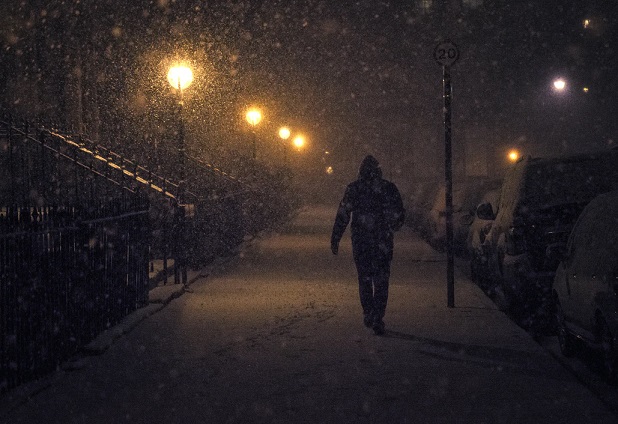As temperatures start to drop and the hours of sunlight become shorter, some people may start to feel more depressed. A condition known as seasonal affective disorder (SAD) can occur during the winter months. However, the restrictions due to COVID-19 will likely create additional challenges for people who experience SAD and other similar conditions.
Sunlight and Circadian Rhythms:
Feelings of depression may become more frequent during the winter months for people who live in northern climates. These “winter blues” can create behavioral changes in people who are experiencing the condition. More research is needed but psychiatrists theorize that the reduction of sunlight may influence the brain’s chemistry. The reduced sunlight during winter days may disrupt the human body’s circadian rhythms.
Circadian rhythms help to regulate the human body’s natural sleep cycle. It increases and decreases over a 24-hour period and send signals to the body as to when it should be awake or sleep. But longer periods of darkness can disrupt this cycle.
Individuals who have a family history of depression and live in northern climates are the most susceptible to SAD. In the United States, this condition, which mental health professionals categorize as a type of generalized depression; appears to impact about 10 million people each year.
Well-known signs of seasonal affective disorder in people is a general sense of low energy or fatigue. These feelings can range from mild to severe. Even individuals who report never experiencing depression, may experience mood swings and lethargy during the winter season. Three common symptoms are:
- Changes in regular sleep patterns
- A depressed mood or feelings of sadness.
- A marked loss of interest in hobbies
The Impact of COVID-19:
The coronavirus pandemic has forced individuals to change how they interact with other people. The demands of social distancing and the level of uncertainty as to when the pandemic will end creates stress and can trigger feelings of depression. During warm weather, it was possible for people to socialize outside and maintain some level of normalcy.
However, the change of seasons and the colder and darker winter months creates new challenges. It is hard for people to maintain outdoor activities during the harsher months of winter. There may be an increase in depressive symptoms across many parts of the country “as the cold weather compounds social isolation.”
The thought of depression increasing across the nation is discerning. Psychiatrists and other health professionals know that adults who report suffering from depression have a lower quality of life. Yet, even during the warmer, sunny months of summer, there are studies that indicate that depression, as a mental health condition, was on the rise.
In a study that was published in the journal JAMA Network Open, data suggest that depression rates have likely tripled in the United States. Researchers stated that data from April, shows that signs of depression in adults have increased from 8.5 percent to 27.8 percent. After large scale traumatic events, it is not unusual for rates of depression to rise in the general population. Similar trends in the U.S. occurred after the September 11 terrorist attacks.
However, after major, public traumatic events the rate increase only doubled (which is still substantial). Additional research is needed, but the data shows the mental health consequences of COVID-19 on people’s health. Everyone needs to recognize the long-term impacts of coronavirus and work to create preventative actions in order to dampen the psychological effect.
Some Healthy Tips & Solutions:
If people are struggling with feelings of severe depression, they should seek help from a mental health professional. They should not feel ashamed or embarrassed to seek therapy. There are types of depression that are persistent and may only become more manageable with proper treatment. But, dealing with feelings of depression during a global pandemic does present additional challenges.
Fortunately, technology does provide some very helpful preventive and treatment tools. The growth of Telepsychiatry means that patients can now receive some mental health treatments from the safety and convenience of their own home. The use of teleconferencing/communication tools means that it is now much easier to gain access to high quality mental health care.
There are a few other solutions that people can implement that are COVID-19 safe. These tips are only general recommendations and are intended to help people successful manage minor feelings of SAD and other depression-like feelings during the pandemic:
- Try to schedule regular phone call with loved ones. Maintaining these connections are essential.
- Having a regular exercise routine that allows you to perform your workout outdoors, or if safe, indoors.
- Strive to create a sense of structure in your daily activities. At the same time, learn to avoid or minimize the triggers that make you feel depressed.
- Consider purchasing light emitting devices known as a light box. These devices are useful at creating artificial light that copies some of the properties for natural sunlight.
- Figure out ways to stay connected and try not to become isolated. Human connection is helpful for managing our anxiety and depression. It may be time to get back to using Zoom or other remote ways to connect with people.
About Emerald Psychiatry:
The successful treatment of depression-related mental health disorders is one of the specialties at Emerald Psychiatry & TMS Center. Their psychiatric practice is located in Dublin, OH.
For more information about their mental health services and treatment options, email or call them. Their main office number is (614) 580-6917.
Follow and like them on Facebook and Twitter:
#DepressionTreatments #EmeraldPsychiatry #OhioPsychiarty #MentalHealth #ColumbusTMS #DublinTMS #WestervilleTMS #OhioPsychiarty #TMS #ColumbusDepressionTreatment #Telepsychiatry
Contributor: ABCS RCM


Recent Comments